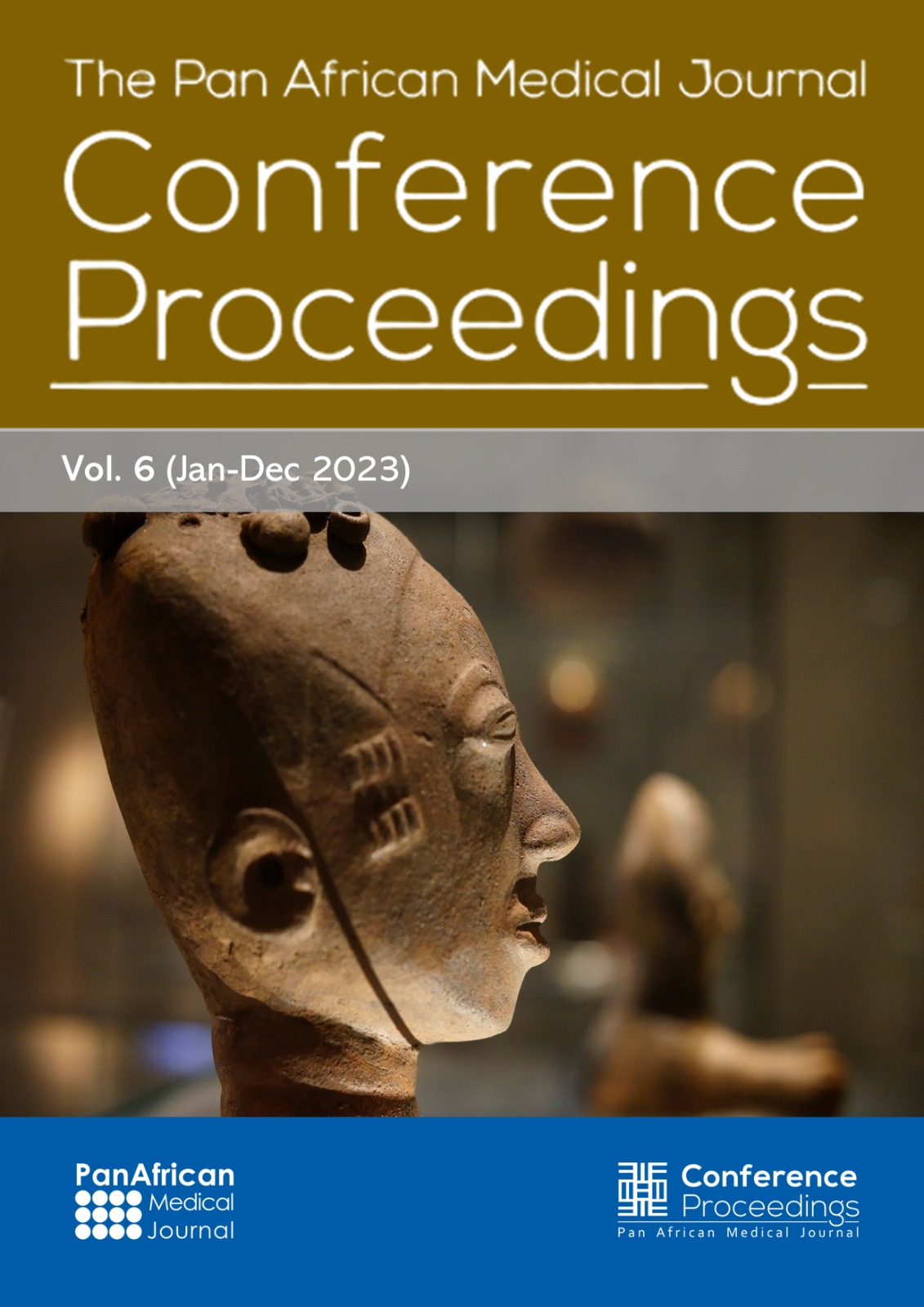Conference abstract
Impact of daily supplementation of Spirulina platensis on the immune system of naïve HIV-1 patients in Cameroon: a 12-months : single blind, randomized, multicenter trial
Pan African Medical Journal - Conference Proceedings. 2023:18(126).03
Oct 2023.
doi: 10.11604/pamj-cp.2023.18.126.2235
Archived on: 03 Oct 2023
Contact the corresponding author
Keywords: Spirulina, HIV, CD4 cells, viral load
Oral presentation
Impact of daily supplementation of Spirulina platensis on the immune system of naïve HIV-1 patients in Cameroon: a 12-months : single blind, randomized, multicenter trial
Ngo Matip Marthe-Elise1,&, Jeanne Yonkeu Ngogang2
1Ecole Nationale Polytechnique de Douala, Douala, Cameroun, 2Department of Physiological Sciences and Biochemistry, Faculty of Medicine and Biomedical Sciences, University of Yaoundé1, Yaoundé, Cameroon
&Corresponding author
Introduction: micronutrient deficiencies occur early in Human Immunodeficiency Virus (HIV) infections they have reverse effects on the nutritional status. The diet supplementation with a natural nutraceutical rich in proteins and micronutrients like Spirulina platensis may be effective and efficient in delaying HIV disease progression by frequently reported improvement in immune response. The aim was to assess the nutraceutical potential of Spirulina platensis of Nomayos on immunological and biochemical markers among HIV-positive ARV-naive subjects.
Methods: a prospective single-blind, randomized, multicenter study conducted on 169 HIV-1 ARV-naïve subjects was recruited and sorted into a test group (82 subjects) and a control group (87 subjects). During the supplementation, individuals in the test group received 10 grams of Spirulina per day for 6 months while those in the control group received only nutritional education. Selected hematological and biochemical as well as CD4 count cells, and viral load copies were assessed at three separate times.
Results: among the 169 ART-naïve participants enrolled in the study, the female was mostly represented (67.1 %). A significant increase of CD4 count cells (596.32–614.92 cells count) and a significant decrease in viral load levels (74.7 × 103–30.87 × 103 copies/mL) of the patients who received a supplementation of S. platensis was found after 6 months of treatment. Haemoglobin level was also significantly higher in the same group while the fasting blood glucose concentration decreased after 12 months compared to control.
Conclusion: a daily supplementation with S. platensis to diet combined with a reasonably balanced diet has significantly increased the CD4 cells and reduced the viral load after 6 months. Further studies are recommended among a large specific group of people infected by HIV to investigate the mechanisms involved in the effect of S. platensis on the immune system.
Impact of daily supplementation of Spirulina platensis on the immune system of naïve HIV-1 patients in Cameroon: a 12-months : single blind, randomized, multicenter trial
Ngo Matip Marthe-Elise1,&, Jeanne Yonkeu Ngogang2
1Ecole Nationale Polytechnique de Douala, Douala, Cameroun, 2Department of Physiological Sciences and Biochemistry, Faculty of Medicine and Biomedical Sciences, University of Yaoundé1, Yaoundé, Cameroon
&Corresponding author
Introduction: micronutrient deficiencies occur early in Human Immunodeficiency Virus (HIV) infections they have reverse effects on the nutritional status. The diet supplementation with a natural nutraceutical rich in proteins and micronutrients like Spirulina platensis may be effective and efficient in delaying HIV disease progression by frequently reported improvement in immune response. The aim was to assess the nutraceutical potential of Spirulina platensis of Nomayos on immunological and biochemical markers among HIV-positive ARV-naive subjects.
Methods: a prospective single-blind, randomized, multicenter study conducted on 169 HIV-1 ARV-naïve subjects was recruited and sorted into a test group (82 subjects) and a control group (87 subjects). During the supplementation, individuals in the test group received 10 grams of Spirulina per day for 6 months while those in the control group received only nutritional education. Selected hematological and biochemical as well as CD4 count cells, and viral load copies were assessed at three separate times.
Results: among the 169 ART-naïve participants enrolled in the study, the female was mostly represented (67.1 %). A significant increase of CD4 count cells (596.32–614.92 cells count) and a significant decrease in viral load levels (74.7 × 103–30.87 × 103 copies/mL) of the patients who received a supplementation of S. platensis was found after 6 months of treatment. Haemoglobin level was also significantly higher in the same group while the fasting blood glucose concentration decreased after 12 months compared to control.
Conclusion: a daily supplementation with S. platensis to diet combined with a reasonably balanced diet has significantly increased the CD4 cells and reduced the viral load after 6 months. Further studies are recommended among a large specific group of people infected by HIV to investigate the mechanisms involved in the effect of S. platensis on the immune system.








